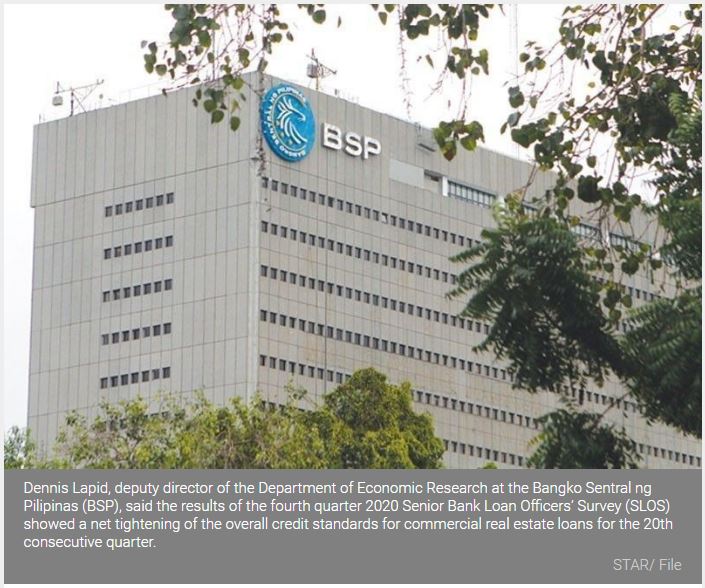Philippines: Banks tighten lending standards
MANILA, Philippines — Banks continued to impose tighter overall credit standards for real estate loans amid less favorable economic conditions and deterioration in borrowers’ profile due to the impact of the pandemic.
Dennis Lapid, deputy director of the Department of Economic Research at the Bangko Sentral ng Pilipinas (BSP), said the results of the fourth quarter 2020 Senior Bank Loan Officers’ Survey (SLOS) showed a net tightening of the overall credit standards for commercial real estate loans for the 20th consecutive quarter.
“Respondent banks pointed to a less favorable economic outlook, a lower tolerance for risk, as well as deterioration in borrowers’ profile as the major contributors to the tightening of overall credit standards for commercial real estate loans,” Lapid said.
On specific credit standards, Lapid said the net tightening of overall credit standards for commercial real estate loans continued to reflect wider loan margins, reduced credit line sizes, stricter collateral requirements and loan covenants, increased use of interest rate floors, and shortened loan maturities.
For the first quarter, Lapid said banks’ responses point to expectations of net tighter credit standards for commercial real estate loans based on the diffusion index approach.
Banks expect a net decline in the demand for commercial real estate loans this quarter amid the deterioration in customers’ economic outlook.
Likewise, Lapid said banks are also expected to further tighten overall credit standards for housing loans amid more uncertain economic prospects, deterioration in borrowers’ profile and profitability of bank’s portfolio, and lower risk tolerance of banks.
Financial institutions are also pointing to a decline in loan demand for housing loans in the first quarter, reflecting largely the consumers’ reduced appetite for housing investment.
The Monetary Board raised the real estate loan limit of big banks to 25 percent from 20 percent in August last year, releasing P1.2 trillion in additional liquidity for lending to the sector to soften the impact of the pandemic.
Last week, S&P Global Ratings warned the significant real estate exposure of Philippine banks may drive asset-quality deterioration further amid the uncertainties brought about by the pandemic.
Latest data from the BSP showed the exposure of Philippine banks in the volatile real estate sector increased to 19.89 percent in end 2019 and almost touched the 20 percent ceiling set by the regulator.
The steady rise in the industry’s real estate exposure could be traced to higher loans extended to the sector, as well as rising property prices.
Lending to property developers booked a double-digit increase of 16.7 percent to P2.16 trillion in end 2019 from P1.85 trillion in end 2018. Commercial real estate loans jumped by 17.8 percent to P1.39 trillion, while residential real estate loans grew by 13 percent to P762.95 billion.
The real estate exposure of Philippine banks peaked at 21.09 percent in end March 2017. The BSP has yet to release the data on the real estate exposure of Philippine banks for 2020.
Source: https://www.philstar.com/business/2021/01/25/2072732/banks-tighten-lending-standards


 Thailand
Thailand




